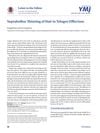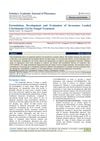 1 citations,
January 2017 in “Elsevier eBooks”
1 citations,
January 2017 in “Elsevier eBooks” The document concludes that new treatments for hair loss may involve a combination of cosmetics, clinical methods, and genetic approaches.
 1 citations,
January 2001 in “Dermatologic Surgery”
1 citations,
January 2001 in “Dermatologic Surgery” Pulsed dye laser and hydrogel dressings effectively treat hypertrophic scars.
 1 citations,
January 2023 in “Przegląd Dermatologiczny”
1 citations,
January 2023 in “Przegląd Dermatologiczny” The Polish Society of Dermatology recommends treatments for alopecia areata that vary by severity, including topical and systemic medications, with long-term maintenance important for management.
 1 citations,
December 2022 in “Middle East Journal of Science”
1 citations,
December 2022 in “Middle East Journal of Science” Permanent hair dyes use chemicals that react with hydrogen peroxide to create color.
 1 citations,
June 2019 in “Innovare journal of medical sciences”
1 citations,
June 2019 in “Innovare journal of medical sciences” Polycystic Ovary Syndrome (PCOS) is a hormonal disorder in women that can cause infertility and other health issues, and it may be improved by treatments that increase insulin sensitivity.
 1 citations,
January 2019 in “Przegla̧d dermatologiczny”
1 citations,
January 2019 in “Przegla̧d dermatologiczny” Skin problems like psoriasis and systemic sclerosis can increase the risk of heart disease, so doctors should watch for heart risks in patients with these conditions.
 1 citations,
May 2017 in “Asian journal of medical sciences”
1 citations,
May 2017 in “Asian journal of medical sciences” The dietary supplement significantly improved skin, nails, and hair in older adults.
 1 citations,
January 2017 in “Yonsei Medical Journal”
1 citations,
January 2017 in “Yonsei Medical Journal” Hair is thinner near the scalp in acute hair shedding conditions.
 1 citations,
January 2014 in “Elsevier eBooks”
1 citations,
January 2014 in “Elsevier eBooks” Melanocytes produce melanin; their defects cause vitiligo and hair graying, with treatments available for vitiligo.
 1 citations,
January 2014 in “Hair therapy & transplantation”
1 citations,
January 2014 in “Hair therapy & transplantation” Platelet-rich plasma treatment is not very effective for chronic severe alopecia areata.
 1 citations,
October 2013 in “Actas Dermo-Sifiliográficas”
1 citations,
October 2013 in “Actas Dermo-Sifiliográficas” Customized medications made through compounding can be beneficial for various skin conditions but require careful regulation and collaboration between doctors and pharmacists.
 1 citations,
December 2010 in “InnovAiT”
1 citations,
December 2010 in “InnovAiT” The document concludes that accurate diagnosis and appropriate management are crucial for treating various hair disorders, which have significant psychological impacts.
 1 citations,
January 2010 in “Elsevier eBooks”
1 citations,
January 2010 in “Elsevier eBooks” Any drug can cause skin reactions, but antibiotics, NSAIDs, and psychotropic drugs are more common, with some reactions being life-threatening.
 1 citations,
May 2006 in “Expert Opinion on Therapeutic Patents”
1 citations,
May 2006 in “Expert Opinion on Therapeutic Patents” No FDA-approved treatments for chemotherapy-induced hair loss existed in 2006; more research was needed.
 January 2024 in “Archives of dermatological research”
January 2024 in “Archives of dermatological research” Both treatments for alopecia areata showed similar modest effectiveness.
 October 2023 in “Paediatrics & child health”
October 2023 in “Paediatrics & child health” The document advises health care providers on how to support transgender and gender-diverse youth with appropriate care and referrals.

Calcipotriene ointment improved a child's skin condition known as En coup de sabre.
 June 2023 in “Dermatology and therapy”
June 2023 in “Dermatology and therapy” The Middle East and Africa need better data, treatment consensus, and support for Alopecia Areata.
 August 2022 in “Scholars academic journal of pharmacy”
August 2022 in “Scholars academic journal of pharmacy” Invasomes loaded with clotrimazole gel could improve drug delivery through the skin for fungal treatment.
 October 2020 in “Veterinary Dermatology”
October 2020 in “Veterinary Dermatology” New treatments and diagnostic methods for various animal skin conditions showed promising results.
 July 2018 in “Elsevier eBooks”
July 2018 in “Elsevier eBooks” New hair loss treatments show promise, but more research is needed to confirm their effectiveness.
 January 2016 in “Springer eBooks”
January 2016 in “Springer eBooks” Understanding drug interactions, side effects, and patient-specific factors is crucial for effective dermatological care.
 January 2009 in “Springer eBooks”
January 2009 in “Springer eBooks” The document concludes that treating skin conditions should include psychological care and a multidisciplinary approach is essential for effective management.
 January 2001 in “Dermatologic Surgery”
January 2001 in “Dermatologic Surgery” The letters discussed medical tools, costs, treatment efficacy, and patient care complexities.
 August 1996 in “Journal of Pediatric and Adolescent Gynecology”
August 1996 in “Journal of Pediatric and Adolescent Gynecology” The document concludes that PCOS in adolescents is complex and requires comprehensive care to manage its symptoms and associated health risks.
 September 2024 in “International Journal of Research and Review”
September 2024 in “International Journal of Research and Review” Wiesbaden 30C effectively reduces hair fall and improves hair growth in young adults with Telogen Effluvium.
 April 2024 in “Canadian Women s Health Today”
April 2024 in “Canadian Women s Health Today” PCOS treatment focuses on lifestyle changes and specific medications to manage symptoms and complications.
 March 2024 in “Buletin de psihiatrie integrativă (Print)”
March 2024 in “Buletin de psihiatrie integrativă (Print)” Hair loss from telogen effluvium can cause mental health issues and lower life quality, needing both medical and emotional support.
 March 2024 in “Clinical, cosmetic and investigational dermatology”
March 2024 in “Clinical, cosmetic and investigational dermatology” Tofacitinib successfully treated vitiligo in a patient with lupus without side effects.
 February 2024 in “PloS one”
February 2024 in “PloS one” Tofacitinib and adalimumab are promising treatments for cicatricial alopecia with few side effects.






























